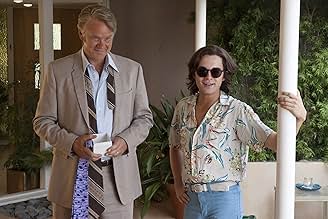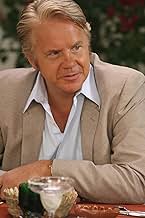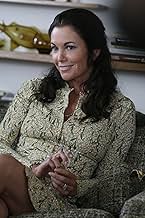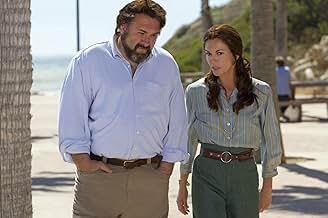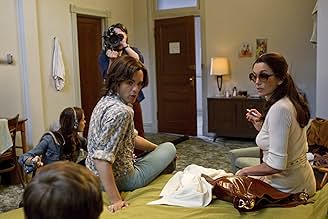IMDb RATING
6.5/10
4.1K
YOUR RATING
A behind-the-scenes look at the making of the first American family to be the subjects of a reality TV show.A behind-the-scenes look at the making of the first American family to be the subjects of a reality TV show.A behind-the-scenes look at the making of the first American family to be the subjects of a reality TV show.
- Directors
- Writer
- Stars
- Won 1 Primetime Emmy
- 7 wins & 34 nominations total
- Directors
- Writer
- All cast & crew
- Production, box office & more at IMDbPro
Featured reviews
"Cinema Verite" may be a new art form: a drama shot in semi-documentary style about a documentary series (shot in 1971, televised nationally in 1973) which itself hovered between the spontaneous and the rehearsed. This 90-minute effort takes about a third of its running time time to get off the ground, but when it does it becomes fascinating as both sociology and drama.
At first it seems as if there is no point in re-enacting the back story to the famous series that followed the ups and downs of the upper-middle-class Loud family of Santa Barbara. Nothing particularly interesting happens as a producer (James Gandolfini) talks a married couple (Diane Lane and Tim Robbins) into allowing cameras into their lives for an unprecedentedly close look at the perfect American family. The real drama begins only when the participants are forced to grapple with the big choices (what and what not to film, what and what not to do when the camera is rolling, how to handle the fact that their lives have decisively changed once the cameras entered). The actors here give themselves totally to this multi-leveled process and come out with flying colors.
We see the actual Loud family in snippets from the original series juxtaposed with their contemporary impersonators who seamlessly fill their shoes, sometimes in mid- conversation. The casting is very good; the resemblances are striking. (But as close a match as Diane Lane is to Pat Loud, Demi Moore would have been even closer.) Some clever member of the creative team even decided to frame the whole enterprise with Mama Cass's 1969 song hit "Dream a Little Dream of Me" (originally a hit in 1931, about 40 years before "An American Family"'s time), allowing the song to surface again, 40 more years down the road, as underscoring to an examination of "the first reality show." A neat touch.
One thing they got wrong was the performance of the underground play "Vain Victory" which the mother attends in the company of her gay son, Lance. The performers and venue for such ragtag productions were a lot funkier than depicted in this otherwise spot-on production. Of course, by 2011 cultural standards such drag acts are as tame and commonplace as Twinkies, but they were enough to drive Pat Loud out of the room back in '71.
At first it seems as if there is no point in re-enacting the back story to the famous series that followed the ups and downs of the upper-middle-class Loud family of Santa Barbara. Nothing particularly interesting happens as a producer (James Gandolfini) talks a married couple (Diane Lane and Tim Robbins) into allowing cameras into their lives for an unprecedentedly close look at the perfect American family. The real drama begins only when the participants are forced to grapple with the big choices (what and what not to film, what and what not to do when the camera is rolling, how to handle the fact that their lives have decisively changed once the cameras entered). The actors here give themselves totally to this multi-leveled process and come out with flying colors.
We see the actual Loud family in snippets from the original series juxtaposed with their contemporary impersonators who seamlessly fill their shoes, sometimes in mid- conversation. The casting is very good; the resemblances are striking. (But as close a match as Diane Lane is to Pat Loud, Demi Moore would have been even closer.) Some clever member of the creative team even decided to frame the whole enterprise with Mama Cass's 1969 song hit "Dream a Little Dream of Me" (originally a hit in 1931, about 40 years before "An American Family"'s time), allowing the song to surface again, 40 more years down the road, as underscoring to an examination of "the first reality show." A neat touch.
One thing they got wrong was the performance of the underground play "Vain Victory" which the mother attends in the company of her gay son, Lance. The performers and venue for such ragtag productions were a lot funkier than depicted in this otherwise spot-on production. Of course, by 2011 cultural standards such drag acts are as tame and commonplace as Twinkies, but they were enough to drive Pat Loud out of the room back in '71.
CINEMA VERITE tries very hard to justify the trend it began in the 1970s by having a camera crew move into the household and private life of the well-to-do Loud family in Santa Barbara. The idea of a docudrama about a docudrama is acceptable as a flag for the obsession with Reality TV shows spawned by this experiment. Unfortunately the writing (by David Seltzer - apparently based on the book written by Pat Loud 'A Woman's Story' about the experience) is spotty and the recreation of (1971 when the 'series' was filmed and 1973 when it hit the television screens) reminds us how boring that time frame was. The direction by Shari Springer Berman and Robert Pulcini imitates the dreary 'spontaneity' of live action drama the film addresses. It plods, tripping on the cables for the cameras placed inside the home of this sad story.
Documentary producer Craig Gilbert (James Gandolfini) devises a concept for PBS he calls 'An American Family' and searches for a family that does not depict the happy-wappy family of staged productions but instead inters the privacy of an American family, examining all the aspects of that institution. He selects the Loud family, particularly because he sees Pat Loud (Diane Lane) as an early women's rights activist able to say truths others might avoid. Gilbert paces his documentary to unveil the dirt that hides behind the scenes - motivated to prod Pat to discover Bill (Tim Robbins) her husband's infidelity, which led her to seek a divorce. The Louds have two sons involved in the dream of becoming a rock band, a daughter in the throes of discovering teenage love, and a gay son Lance (Thomas Dekker) who has moved to New York to live a raucous life without the approval of his father but one visited by Pat without complete acceptance. The film crew consists of a married couple - Alan Raymond (Patrick Fugit) and Susan Raymond (Shanna Collins) - who reluctantly agree to film even the most embarrassing scenes of the film. The gradual crumbling of the Loud marriage - not helped by either Gilbert or by Pat's 'friend' Val (Lolita Davidovich) who is actually another one of Bill's affairs - is what producer Gilbert wants to record, and he succeeds. The Louds end their marriage, Lance later dies of AIDS, and the other children have minor successes in their lives. But the overriding feeling of this film is showing how the inquisitive media can be destructive in attempting to share reality with the world at large. And so began the glut of reality shows that yearly grow more irreverent in respecting privacy.
Diane Lane brings moments of brilliance to her role as the manipulated Pat and James Gandolfini is given the opportunity to push his acting chops. The problem is that we all know the quasi-tragic story on which this film is based, and making us witness it again is less than entertaining. It is disturbing.
Grady Harp
Documentary producer Craig Gilbert (James Gandolfini) devises a concept for PBS he calls 'An American Family' and searches for a family that does not depict the happy-wappy family of staged productions but instead inters the privacy of an American family, examining all the aspects of that institution. He selects the Loud family, particularly because he sees Pat Loud (Diane Lane) as an early women's rights activist able to say truths others might avoid. Gilbert paces his documentary to unveil the dirt that hides behind the scenes - motivated to prod Pat to discover Bill (Tim Robbins) her husband's infidelity, which led her to seek a divorce. The Louds have two sons involved in the dream of becoming a rock band, a daughter in the throes of discovering teenage love, and a gay son Lance (Thomas Dekker) who has moved to New York to live a raucous life without the approval of his father but one visited by Pat without complete acceptance. The film crew consists of a married couple - Alan Raymond (Patrick Fugit) and Susan Raymond (Shanna Collins) - who reluctantly agree to film even the most embarrassing scenes of the film. The gradual crumbling of the Loud marriage - not helped by either Gilbert or by Pat's 'friend' Val (Lolita Davidovich) who is actually another one of Bill's affairs - is what producer Gilbert wants to record, and he succeeds. The Louds end their marriage, Lance later dies of AIDS, and the other children have minor successes in their lives. But the overriding feeling of this film is showing how the inquisitive media can be destructive in attempting to share reality with the world at large. And so began the glut of reality shows that yearly grow more irreverent in respecting privacy.
Diane Lane brings moments of brilliance to her role as the manipulated Pat and James Gandolfini is given the opportunity to push his acting chops. The problem is that we all know the quasi-tragic story on which this film is based, and making us witness it again is less than entertaining. It is disturbing.
Grady Harp
These reality show movies are hard to watch. I did not hear about the Louds before. But it would have been interesting to watch what went wrong with America's sweetheart family. However, the script did not have enough punch to hold the interest for the entire time. James Gandolfini is such a good actor. He made an unlikeable character tolerable. Diane Lane was not quite believable as a gullible, wronged woman. Tim Robbins was watchable, however something was missing and I just didn't believe in his character. It started out fine, had a lot of potential when it moved to Manhattan, but somewhere down the second act, it lost its grip. Wish it had the momentum going somehow. Alas, it didn't end too well for me.
"One must never let the public behind the scenes for they are easily disillusioned and then they are angry with you, for it is the illusion they love." The first successful reality show was on PBS and it was about the Loud family. The show followed around Pat (Lane) and Bill (Robbins) Loud and their family. It was the first of it's kind and this movie about how it started, what it was like while it was going on and the aftermath. I was actually pretty excited about watching this because of the cast. I have to say I was not disappointed at all. The acting was great in this and the movie itself was very entertaining. I have never been a fan of reality TV but it was very interesting to see how the genre began and the immediate impact that the show had. I do have to say though that as great as this movie is and how interesting it was to see the family problems come to the surface I still have no interest to watch the real "American Family" show. That in no way means that I did not enjoy watching the Loud family in this movie though. Overall, an excellent movie that should be watched. Very, very interesting and makes me wonder how accurate it is. I give it an A-.
Minor, though still entertaining cable-made docudrama from directors Shari Springer Berman and Robert Pulcini chronicling the would-be Sturm und Drang that went on behind-the-scenes of PBS's "American Family", an 11-hour television series in 1971 which presented the lives of The Louds, a "typical" family from Santa Barbara, CA. The Louds, who have since cemented their legacy as the first reality-TV family, brought in big ratings for the so-called "education network". Ordinary people, they were picked out of a society column by an ambitious producer and were followed around by a small camera-crew for some 78 days; still, high drama was hard to come by (patriarch Bill Loud had the wandering eye; eldest son Lance Loud was a flamboyant singer who had already moved to New York City when production began; while spouse Pat Loud, strong and confident, was the glue who kept kids and husband together). There wasn't much happening behind--nor in front of!--the lens, except for some mild flirting between Pat and the crafty, cunning producer, and Pat's discovery that her husband had been carrying on affairs with a number of different women. The editors of the actual show had a tough time piecing together enough watchable product, while this rendering of events, penned by the estimable David Seltzer, suffers the same fate. The groovy production-design is spot-on, and Diane Lane has several strong moments portraying Pat...yet this American family simply wasn't cliffhanger material. It all seems much ado about nothing.
Did you know
- TriviaIn the scene where Lance Loud is on the phone with his family, he reads a media description of himself and his "flamboyant, leech-like homosexuality". That's a direct quote from an article written for The New York Times by Anne Roiphe. She made equally scathing remarks about the entire Loud family.
- GoofsThe Louds' Mercedes has a California plate with the number style 1AAA000. These plates did not appear until 1980.
- ConnectionsFeatured in The Tonight Show with Jay Leno: Episode #19.129 (2011)
- SoundtracksDream A Little Dream
Written by Fabian Andre, Gus Kahn & Wilbur Schwandt
Performed by Cass Elliot (as Mama Cass)
Courtesy of Geffen Records under license from Universal Music Enterprises
Details
- Release date
- Country of origin
- Language
- Also known as
- Rạp chiếu phim Verite
- Production companies
- See more company credits at IMDbPro
- Runtime1 hour 26 minutes
- Color
- Sound mix
- Aspect ratio
- 1.78 : 1
Contribute to this page
Suggest an edit or add missing content



